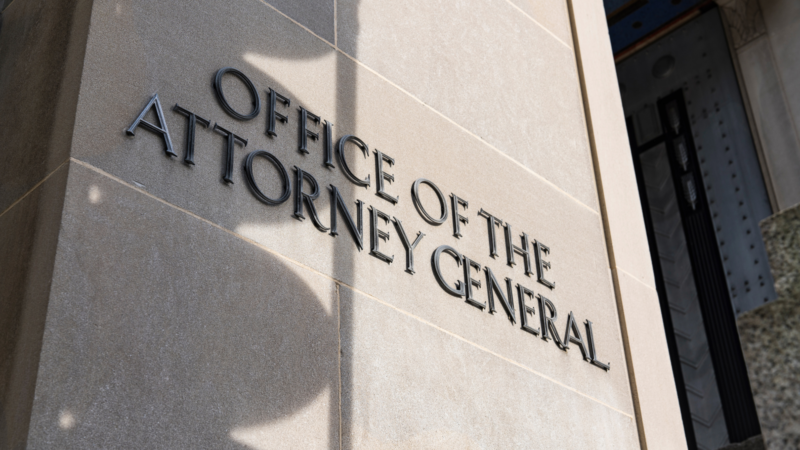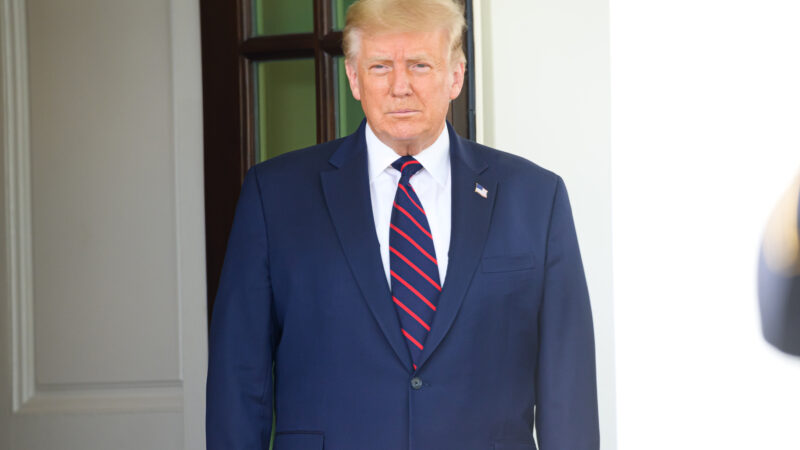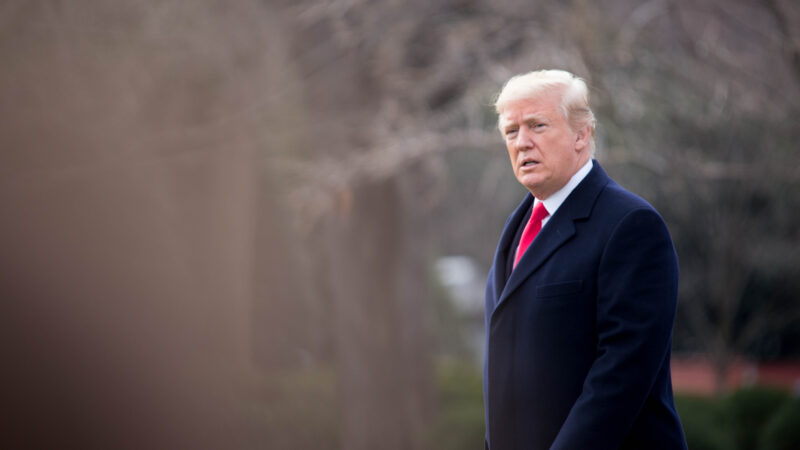Kristy Parker is Special Counsel at Protect Democracy. She leads litigation to secure accountability for abuses of executive power and interference with government functions, and leads advocacy to reform the Department of Justice and protect its independence from politicization.
Four misconceptions about Trump’s federal January 6th indictment
- August 14, 2023
What commentators are getting wrong about the charges for conspiring to overturn the election

In July, former president Donald Trump was indicted for leading a criminal scheme to overturn the 2020 election and stay in power despite his defeat. Among other things, this sparked a national discussion about the merits of the charges and whether the Justice Department acted appropriately in bringing the case.
In early 2023, I co-authored a guide with colleagues on how to assess whether a government-led prosecution of a political leader is appropriate — or an abuse of power. In it, we explain that if an indictment comports with established legal precedent and the Justice Department’s charging guidelines that is a good sign the prosecution — of anyone, including a high-ranking political leader like Trump — is in line with democratic principles.
So a public conversation that helps Americans understand the nature of the charges, what prosecutors have to prove in order to convict, and the legal viability of Trump’s defense arguments, is the right conversation to have.
But some commentary about these questions is getting it wrong and helping to buttress arguments that the indictment is on shaky legal ground and that it was ill-advised for the Special Counsel to charge a former president and current candidate.
Here’s what those arguments are missing:
The charges in the federal indictment are not “novel”1. The charges in the federal indictment are not “novel”
Several commentators have suggested that the charges in the indictment are novel applications of the law and that the Justice Department should not have charged a former president with these crimes because doing so is – or will be perceived as – unfair and invites a too-great risk of acquittal or reversal on appeal. This is wrong.
Of course, a sitting president leading a conspiracy to overturn the results of an election is, fortunately, a unique factual circumstance. But this isn’t the first time the government has enforced the statutes Trump is charged with violating and he had fair warning that his actions were illegal. In fact, the Supreme Court has explained that defendants “can still be on notice that their conduct violates established law even in novel factual circumstances.”
And that is easily the case here.
The indictment charges Trump with violating three separate conspiracy statutes. Those statutes are routinely enforced to address conduct similar to what is alleged against Trump: agreeing with others to (a) submit false documents to and otherwise deceive government officials, (b) obstruct official proceedings, and (c) interfere with the rights of Americans to cast votes in elections and have those votes counted.
The Justice Department has even used the most untested charge — an alleged violation of the statute that criminalizes corruptly obstructing official proceedings, 18 USC §1512(c) — to prosecute hundreds of defendants who participated in the insurrection, resulting in numerous decisions by judges of the district court and a decision from the DC Circuit Court of Appeals validating the Department’s use of the statute to prosecute aspects of the events that occurred as part of the insurrection.
Those decisions have explained that physically disrupting an official proceeding or persuading someone else to do so for the purpose of obtaining a personal benefit (such as remaining president in spite of the election results) comports with the statute’s plain text and the meaning of acting “corruptly.”
So there is no basis for the claim that Trump is being unfairly or inappropriately singled out for committing newly-minted crimes.
The indictment doesn’t attempt to criminalize free speech2. The indictment doesn’t attempt to criminalize free speech
Claims that Trump’s trial will be a contest between “free speech” and “lies” also miss the mark.
Trump argues that he has a First Amendment right to petition the government with his claims that the 2020 election was fraudulent. The Justice Department agrees, and in the third paragraph of the indictment acknowledges that Trump had a right not only to petition the government, but even to spread outright lies about the election.
But the indictment doesn’t charge Trump with doing either of those things.
Instead, it charges him with participating in a scheme to submit false electoral slates to various government bodies and press others to illegally overturn election results that the states and multiple courts had established as lawful. None of that is protected by the First Amendment.
As my colleague Cameron Kistler recently explained, the fake elector scheme is charged as a conspiracy to defraud the government. And “[t]he concept that acts of fraud fall outside of the First Amendment has been affirmed in multiple Supreme Court decisions joined by Republican-appointed justices that have stood for decades. While there are many difficult constitutional questions about the First Amendment, the question of whether there’s a First Amendment right to defraud the United States is very simple. There’s not.”
Likewise, there is no First Amendment right to lie to the government, as Trump is alleged to have done.
Trump’s attorneys claim that his pleas to public officials (like Brad Raffensberger) to find him votes, were not orders, direction, or coercion, but rather merely “aspirational” requests. But Trump’s characterizations won’t matter. To prove an illegal conspiracy, prosecutors will simply need to convince a jury that Trump’s words and actions were in furtherance of an agreement to commit fraud, obstruct the electoral count proceeding, or interfere with voting rights.
Conspiracies nearly always involve the use of words, but words integral to forming criminal agreements are not protected by the First Amendment.
The government doesn’t have to prove Trump knew he lost the election3. The government doesn’t have to prove Trump knew he lost the election to establish criminal intent
In any criminal case, the government has to prove beyond a reasonable doubt that the defendant had the requisite mens rea, or guilty state of mind. In this case, many have assumed that means the government will need to prove that Trump knew he lost the election and that the case will be nearly impossible to win as a result.
Again, this is not so.
Based on the indictment, it seems the government plans to demonstrate Trump knew he lost the election with evidence that shows multiple people on his staff told him so. The government will likely also highlight the numerous court cases Trump and his campaign lost and even his own admissions that he lost the election. Under the prevailing standard for proving a person’s state of mind, the evidence that Trump knew he lost is quite strong.
But even if the jury has reasonable doubt that Trump knew he lost, none of the illegal acts charged in the indictment would be made legal by Trump’s subjective belief that he won the election. The intent elements of the statutes Trump is charged with violating make this point:
- Conspiracy: For each of the conspiracy charges, the government has to prove that Trump intended to enter an agreement with one or more of his co-conspirators to achieve the charged object of the conspiracy, whether the goal was to defraud the government, obstruct an official proceeding, or deprive people of the right to have their lawful votes counted. Whatever Trump’s underlying motivation was for making the agreement is irrelevant.
- Defrauding the United States: Establishing that Trump conspired to defraud the United States requires proof that Trump intended to obstruct a lawful function of the government “by deceit, craft or trickery, or at least by means that are dishonest.” This would be satisfied by proof that Trump agreed to submit slates of electors from various states to the National Archives and Congress that he knew were false. Again, it doesn’t matter that Trump believed that he should have been awarded the electoral votes of those states, only that he knew the slates did not reflect votes cast by electors actually appointed by the states.
- Obstructing an Official Proceeding: This charge centers on the conspirators’ effort to halt or delay the certification of Joe Biden’s election on January 6. For that to be a crime, the government must show that the conspirators intended to obstruct the congressional proceedings for counting the electoral votes submitted by the states — which they clearly did. The government must also prove that the conspirators acted “corruptly.” Acting “corruptly,” as the courts handling hundreds of January 6 cases have defined it, means acting through independently unlawful means (i.e., doing something that would be illegal on its own), or acting with “a hope or expectation of either financial gain or other benefit to oneself or a benefit to another person,” to achieve an unlawful result. The courts have found that physically disrupting a proceeding through violence or trespass satisfies this definition, as does “helping their preferred candidate overturn the election results.” The defendant must also act with “consciousness of wrongdoing,” meaning “with an understanding or awareness that what the person is doing is wrong.”
The government could prove this element by showing that Trump and his conspirators pressured the vice president to accept false electors rather than the real ones. Both by pressuring him personally and by weaponizing the violent mob that occupied the Capitol, while knowing that it was wrong. Once again, Trump’s belief that he won the election would not excuse him from liability so long as he understood that the vice president did not have authority to refuse to accept the lawfully appointed electors OR that it was illegal to achieve his preferred result by leveraging violence and trespass. As one Reagan-appointed judge put it in another case, “[e]ven if [the defendant] sincerely believed — which it appears he did — that … President Trump was the rightful winner . . . he still must have known it was unlawful to vindicate that perceived injustice by engaging in mob violence to obstruct Congress.”
- Interfering with Rights. This statute requires the government to prove that Trump and his co-conspirators injured a person in the free exercise of a right protected by the Constitution or federal law — in this case the right to vote and have their vote counted. What’s relevant is the intent to prevent lawfully cast votes from being counted. Whether Trump believed the states and the courts should have considered certain votes to be lawful is, once again, irrelevant.
4. Trump isn’t immune from prosecution because he was president when the conduct charged occurred
Finally, Trump’s attorneys and some commentators have suggested that Trump is immune from prosecution for actions he took while he was president. Given Trump’s expansive view of presidential authority and his disdain for the separation of powers, this position is unsurprising. But the idea that the president can escape accountability for crimes committed in office is unfounded.
Yes, the president is immune from civil lawsuits seeking damages for conduct that constitutes a function of the office of the presidency. And the Justice Department also has a policy against prosecuting a sitting president for crimes. But the president has never been held to be immune from prosecution after his term has ended for crimes committed while in office. And no immunity would apply to a president’s actions if they were outside presidential functions.
Trump, of course, is not the sitting president. And even if a version of presidential immunity applied in criminal cases, any argument that soliciting state officials to ignore their legal duties, submitting false slates of electoral votes to Congress, or interfering with the congressional process of counting of electoral votes are “presidential” functions, is dubious at best.
None of this should suggest that it will be easy for prosecutors to prove every element of their case to a unanimous jury of twelve. Or that courts will validate every aspect of their legal theories.
It is simply to say that the charges against Trump are well within the bounds of how prosecutors appropriately apply existing law to new factual situations. And that these charges do not seek to infringe either on Trump’s constitutional rights or the legitimate powers of the presidency.
There is no legal reason Trump should not be subject to the same criminal process as anyone else alleged to have engaged in similar conduct. The accountability necessary for a healthy democracy and the rule of law demand no less.
Related Content
It can happen here.
We can stop it.
Defeating authoritarianism is going to take all of us. Everyone and every institution has a role to play. Together, we can protect democracy.
Donate
Sign Up for Updates Sign Up for Updates
Explore Careers Explore Careers
How to Protect Democracy How to Protect Democracy



